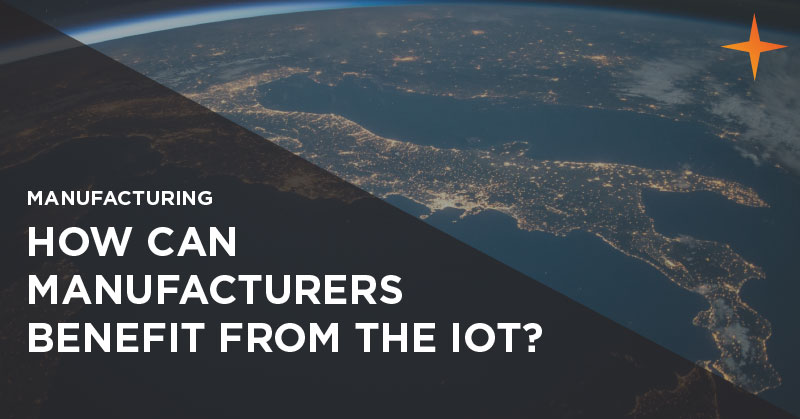Blog
How will the IoT change manufacturing?
January 27th, 2015

Since the industrial revolution, the manufacturing sector has had to change and evolve to compete. It has gone through 3 main technical ages, from mechanisation to assembly lines and then onto programmable logic controllers. Going forward, with the rise of the Internet of Things (IoT) we will see a fourth definable technical age.
It has started somewhat through manufacturers using technology to deliver vision through the manufacturing process, from raw materials, through manufacturing cells, into the store and then onto dispatch. Many operations are already keeping in contact with their equipment post-sales, to improve levels of service, additional revenue streams and customer buy-in. This trend is rising as the technology around the Internet of Things (IoT) ramps up. The amount of intelligence that the manufacturer will be able to get from its products calling home is just huge. It’s going to change things quickly for many, such as:
1. Service improvement
We all know that IT service desks within businesses have been connecting remotely to their client PCs, laptops and other devices for years. They can quickly connect, identify issues and get the customer operational again, typically within a short time frame. This will be taken further on a wider level down to the IoT, i.e. products will also be able to report in to proactively alert the manufacturer to issues, allowing them, or a 3rd party to make contact with the customer before an issue impacts them. It should also be noted that connected products will also be able to receive software updates, reducing issues whilst improving reliability and security. All of these touchpoints also help with brand-loyalty and potentially cross-selling/up-selling.
2. Quality
The data can be to whatever level they wish, within reason and without customer privacy issues. All of this field data can be mined to provide information. For example, the mean time before failure of a particular product or a part, performance issues, reoccurring problems, etc. This data will allow for the identification of trends, to assist with areas, such as future product development and supplier selection.
3. Additional revenue streams
Network connected products mean that the manufacturer or an intermediary is providing a service to their customer. This potentially paves the way for additional features to be built into products to enhance functionality, service and revenue.
4. Inventory optimisation
If products can communicate back into service hubs it does give an operation an opportunity to deal with inventory more effectively. From automatic ordering to build scheduling or shipping in preparation for a product that is signalling issues. For many years IT hardware manufacturers have been shipping replacement hard disks if a monitoring system flags that a disk may fail. Of course, this service is only available to customers with an up-to-date warranty – again another opportunity!
5. Research and development
The data collected and analysed from products in the field will greatly aid manufacturers’ research and development cycle. The ability to collect live information, analyse and adapt at speed will be essential in the coming years. Also, historical data from in the field products married with service information, sales trends, etc. will give manufacturers real vision and shape product development going forward.
Manufacturers have always been one of the first to adopt developing technology and are constantly striving to improve factory efficiency. So I believe we are going to have some very interesting and exciting times ahead of us. In reality, the IoT is here in many ways, but it will penetrate further and deeper than most imagine. The other thing to be aware of is that the technologies and principles aren’t that new, so manufacturers will be able to exploit the benefits with relative ease.
Robert Rutherford – CEO of QuoStar
Discover QuoStar’s IT solutions for manufacturers
In the press: Digitising the courtroom and the impact on law firms
Andrea Beech asks how digitising the courtroom could affect law firms. In the Autumn Statement last month, an increased focus on digital and technology was a common thread across all departments, from a £450m investment for the Government Digital Service to a £1bn investment in a 4G communications network for the emergency services. As part […]
What is IT outsourcing?
IT outsourcing is the practice of using an external service provider to deliver some or all of the IT functions required by a business including managing infrastructure, directing strategy and running the service desk. IT outsourcing providers can take full responsibility for all IT maintenance and support, this is called a fully managed service, or […]
QuoStar achieves ISO 20000 certification
QuoStar Solutions, the IT consultancy and outsourcing provider, has today announced that it has been awarded ISO 20000 certification. The international standard recognises the highest level of service quality for clients and facilitates continual improvement; both of which align with QuoStar’s business strategy and ethos. Based on ITIL (IT Service Information Library), ISO 20000 was given […]